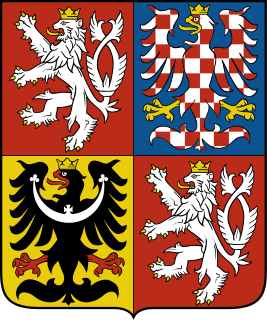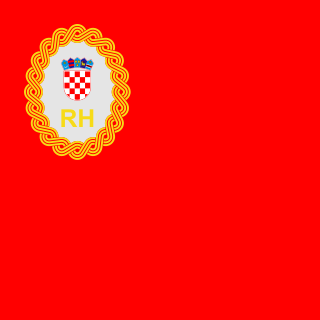President of the Chamber of Deputies may refer to:

Czech Republic is a unitary parliamentary constitutional republic, in which the President is the head of state and the Prime Minister is the head of government.
Executive power is exercised by the Government of the Czech Republic which reports to the Chamber of Deputies. The Legislature is exercised by the Parliament. Czech Parliament is bicameral, the upper house of the Parliament is the Senate, the lower house of the Parliament is the Chamber of Deputies. The Senate consists of 81 members who are elected for six years. The Chamber of Deputies consists of 200 members who are elected for four years. The Judiciary system is topped by the trio of Constitutional Court, Supreme Court and Supreme Administrative Court.
The highest legal document is the Constitution of the Czech Republic, complemented by constitutional laws and the Charter of Fundamental Rights and Freedoms. The current constitution went in effect on 1 January 1993, after the Dissolution of Czechoslovakia.

The speaker of a deliberative assembly, especially a legislative body, is its presiding officer, or the chair. The title was first used in 1377 in England.

The President of the Czech Republic is the head of state of the Czech Republic and the commander-in-chief of the Armed Forces of the Czech Republic.

The Congress of the Dominican Republic is the bicameral legislature of the government of the Dominican Republic, consisting of two houses, the Senate and the Chamber of Deputies. Both senators and deputies are chosen through direct election. There are no term limits for either chamber.

The Chamber of Deputies is the lower chamber of the Congress which, along with the Senate, composes the legislature of the Dominican Republic.

The Senate of the Republic or Senate is the upper house of the bicameral Italian Parliament. The two houses together form a perfect bicameral system, meaning they perform identical functions, but do so separately. The Senate currently has 315 seats. Pursuant to the amended Articles 57, 58, and 59 of the Italian Constitution, the Senate has a variable number of members, of which 196 will be elected from Italian constituencies in the next election, 4 from Italian citizens living abroad, and a small number are senators for life, either appointed or ex officio. It was established in its current form on 8 May 1948, but previously existed during the Kingdom of Italy as Senato del Regno, itself a continuation of the Senato Subalpino of Sardinia established on 8 May 1848. Members of the Senate are styled Senator or The Honourable Senator and they meet at Palazzo Madama, Rome.

The Chamber of Deputies is the lower house of the bicameral Parliament of Italy. The two houses together form a perfect bicameral system, meaning they perform identical functions, but do so separately. The Chamber of Deputies has 630 members. Pursuant to the amended article 56 of the Italian Constitution, the Chamber of Deputies will have 400 seats following the next election, of which 392 will be elected from Italian constituencies, and 8 from Italian citizens living abroad. Deputies are styled The Honourable and meet at Palazzo Montecitorio.

Romania elects on a national level a head of state – the president – and a legislature. The president is elected for a five-year term by the people. The Romanian Parliament has two chambers. The Chamber of Deputies has currently 330 members, elected for a four-year term by party-list proportional representation on closed lists. The Senate has currently 136 members, elected for a four-year term by party-list proportional representation on closed lists.

The Italian Parliament is the national parliament of the Italian Republic. It is the representative body of Italian citizens and is the successor to the Parliament of the Kingdom of Italy (1861–1943), the transitional National Council (1943–1945) and the Constituent Assembly (1946–1948). It is a bicameral legislature with 945 elected members and a small number of unelected members. The Italian Parliament is composed of the Chamber of Deputies and Senate of the Republic. The two Houses are independent from one another and never meet jointly except under circumstances specified by the Constitution. Following a referendum on 21 September 2020, the number of MPs in the Parliament will be reduced from 630 to 400 in the Chamber of Deputies and from 315 to 200 in the Senate.

National-level elections in Italy are called periodically to form a parliament consisting of two houses: the Chamber of Deputies with 630 members; and the Senate of the Republic with 315 elected members, plus a few appointed senators for life. Italy is a parliamentary republic: the President of the Republic is elected for a seven-year term by the two houses of Parliament in joint session, together with special electors appointed by the Regional Councils.

The Senate is the upper chamber of Nigeria's bicameral legislature, the National Assembly of Nigeria. The National Assembly is the nation's highest legislature, whose power is to make laws, is summarized in chapter one, section four of the 1999 Nigerian Constitution. It consists of 109 senators: the 36 states are each divided in 3 senatorial districts each electing one senator using the first-past-the-post electoral system; the Federal Capital Territory elects only one senator also using first-past-the-post.

The president of Italy, officially denoted as President of the Italian Republic is the head of state of Italy. In that role, the officeholder represents national unity, guarantees that Italian politics comply with the Constitution of Italy and is the head of the Italian Armed Forces and chairs the Justices. The president's term of office lasts for seven years. The current holder is former Constitutional Judge Sergio Mattarella, who was elected on 31 January 2015.

The Chamber of Deputies, officially the Chamber of Deputies of the Parliament of the Czech Republic, is the lower house of the Parliament of the Czech Republic. The chamber has 200 seats and deputies are elected for four-year terms using the party-list proportional representation system with the D'Hondt method. Since 2002, there are 14 constituencies, matching the Czech regions. A Cabinet is answerable to the Chamber of Deputies and the Prime Minister stays in office only as long as they retain the support of a majority of its members. The quorum is set by law to one third (67) of elected deputies. Any changes to the constitutional laws must be approved by at least 60 percent of the Chamber of Deputies. The seat of the Chamber of Deputies is the Thun Palace in Malá Strana, Prague.

The Senate of the Parliament of the Czech Republic, usually referred to as Senate, is the upper chamber of the Parliament of the Czech Republic. The seat of the Senate is Wallenstein Palace in Prague.
State decorations of the Czech Republic recognize outstanding acts of service to the Czech Republic. They are awarded by the President of the Czech Republic, usually, but not necessarily, on the recommendation of the Chamber of Deputies, the Senate or the Prime Minister of the Czech Republic. They may also be promulgated solely on the president's authority. They come in two varieties: orders being the higher honor and medals the lower.
The President of the Chamber of Deputies of the Parliament of the Czech Republic, also referred to as the Speaker of the Chamber of Deputies, is an elected presiding member of the Chamber of Deputies of the Czech Republic. Since 10 November 2021, the president has been Markéta Pekarová Adamová of TOP09.

The speaker of the Croatian Parliament is the presiding officer in the Croatian Parliament, Croatia's legislative body.

The President of the Chamber of Deputies is the speaker of the lower house of the Italian Parliament, the Chamber of Deputies. It is the third highest-ranking office of the Italian Republic, after the President of the Republic and the President of the Senate. Since 24 March 2018, the role has been held by Roberto Fico.

The Council of Ministers of Lebanon is the executive body of the Republic of Lebanon. Its president is the Prime Minister of Lebanon, and it is appointed by the President of Lebanon with confirmation of the Parliament of Lebanon. It is typically composed of an equal number of Muslims and Christians. The Council of Ministers is considered to be the "government" of Lebanon by the Constitution.